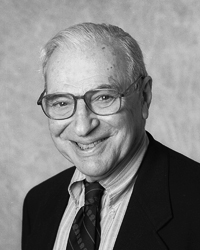
Kenneth Arrow 1921 - 2017. Image: Linda A. Cicero / Stanford News Service, CC BY 3.0.
The Nobel Prize winning economist Kenneth J. Arrow died on Tuesday at his home in California. He was 95.
Arrow's contributions to economics were wide-ranging, but our favourite concerns something that's of immediate importance to all of us: democracy. As the recent US elections have shown yet again, the outcome of an election is not always entirely democratic. It was Hilary Clinton who won the popular vote, but Trump is president. Once you start thinking about voting systems, you soon realise that designing a good one is tricky.
So is there a perfect voting system? Arrow asked himself this question in the 1950s and found that the answer is no — even if you only make the most basic demands of the system.
Kenneth defined a voting system in a very mathematical way, as follows. There is a population of voters each of whom has a preference ranking of the candidates. A voting system takes these millions of preference rankings as input and by some method returns a single ranking of candidates as output. (If people only have one vote, then an input ranking would involve ties, as in "Clinton first, all the rest second".) The government can then be formed on the basis of this single ranking.
For a voting system to make any democratic sense, Kenneth required it to satisfy each of the following, fairly basic constraints:
- The system should reflect the wishes of more than just one individual (so there's no dictator).
- If all voters prefer candidate x to candidate y, then x should come above y in the final result (this condition is sometimes called unanimity).
- The voting system should always return exactly one clear final ranking (this condition is known as universality).
He also added a fourth, slightly more subtle condition:
- In the final result, whether one candidate is ranked above another, say x above y, should only depend on how individual voters ranked x compared to y. It shouldn't depend on how they ranked either of the two compared to a third candidate, z. Arrow called this condition independence of irrelevant alternatives.
Arrow proved mathematically that if there are three or more candidates and two or more voters, no voting system that works by taking voters' preference rankings as input and returns a single ranking as output can satisfy all the four conditions. His theorem, called Arrow's Impossibility Theorem helped to earn him the 1972 Nobel Prize in Economics.
You can find out more about the maths of voting in these Plus articles.